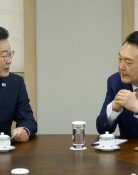Japans investment in Korea sharply declines due to bilateral relationship
Japans investment in Korea sharply declines due to bilateral relationship
Posted November. 15, 2013 07:11,
Rumor has it that a series of businesses will go bankrupt at early next year, an owner of a Korean restaurant in Shinokubo, a famous area for Korean culture in Tokyo. He added, Our revenue is cut in half. It has been hit hard as many Japanese do not visit Korean restaurants in Tokyo.
The diplomatic relationship between Korea and Japan is worst ever and the bilateral economic relationships are fast deteriorating. Some say that the strained relationship could hit companies and consumers hard.
The trade volume between the two countries clearly shows the strained relationship. The trade volume from the first nine months of this year fell by 6.3 billion U.S. dollars year-on-year to 71 billion dollars. It could fall below 100 billion dollars in three years since 2010 when both economies were constrained in the wake of the global financial crisis.
For example, Koreas export of Makgeolli, a Korean traditional alcohol, to Japan was 14.3 million dollars for the first nine months of the year, which is down by 54 percent from the same period of last year (31.1 million dollars). As Koreas largest Makgeolli export destination, Japan`s import exceeded 500 million dollars in 2011. With the dwindling interest in the Korean pop culture, however, the export sales of the traditional alcohol is on a sharp decrease.
Japanese companies invested 1.96 billion dollars in the first three quarters of this year, more than 40 percent down from the same period of last year (3.3 billion dollars). The number of Japanese tourists visiting Korea was 2.06 million for the first nine months of this year, more than 700,000 less than the same period of last year. The tourism industry says that the number of Japanese women in their 60s who led the Korean pop culture fad decreased in particular.
Many analysts see that the Korean government did not extend the currency swap contract with the Japanese financial authorities because of the strained relationship. Lee Woo-kwang, a senior analyst of Korea-Japan Cooperation Foundation for Industry and Technology, said, The economic damage to Koreans and Korean companies is much larger due to the strained relationship. A rational approach is more needed than an emotional one for rapprochement.







